This blog serves my Nixon course (Claremont McKenna College Government 124A) for the fall of 2022
About This Blog
I shall post videos, graphs, news stories, and other material. We shall use some of this material in class, and you may review the rest at your convenience. You will all receive invitations to post to the blog. I encourage you to use the blog in these ways:
· To post questions or comments;
· To follow up on class discussions;
· To post relevant news items or videos.
There are only two major limitations: no coarse language, and no derogatory comments about people at the Claremont Colleges.
Syllabus: https://gov124.blogspot.com/2022/08/cases-in-american-political-leadership.html
Thursday, January 31, 2019
Nixon really is everywhere
I was reading my public policy textbook and stumbled across this Nixon reference. During his presidency, Nixon created several "new federalism" initiatives that were designed to decentralize the federal government. These initiatives turned categorical grants, which can only be used for certain departments/programs, into block grants, which aren't as limited.
Nixon and Kennedy in the 1950s
Anticommunism in 1950
October 1, 1949: Mao wins in China. MAKE A MENTAL NOTE OF THE CHINA LOBBY
June 25, 1950: Korean War starts
Joe McCarthy 2/9/1950:
The legend of George Smathers, "Red Pepper" (Matthews, p. 70) and "Vote American"
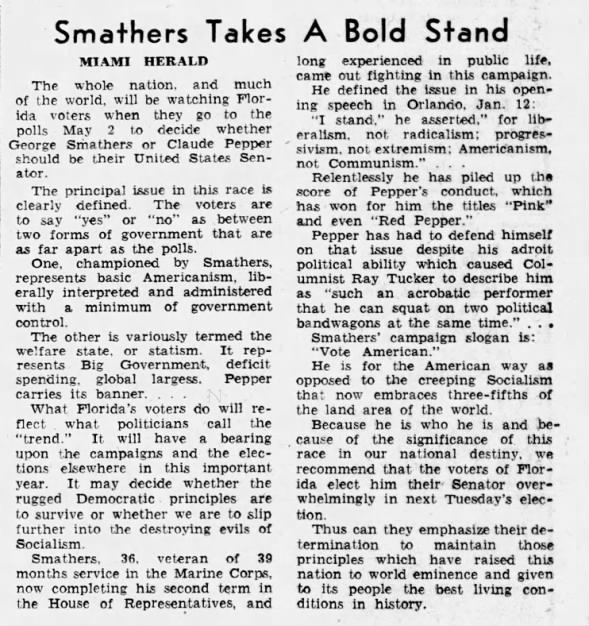 Sun, Apr 30, 1950 – 27 · The Tampa Tribune (Tampa, Florida, United States of America) · Newspapers.com
Sun, Apr 30, 1950 – 27 · The Tampa Tribune (Tampa, Florida, United States of America) · Newspapers.com
The home of Manchester Boddy (Matthews p. 69) is a local attraction in La Canada.
From a History Channel documentary on the Matthews book: Start at 9:00
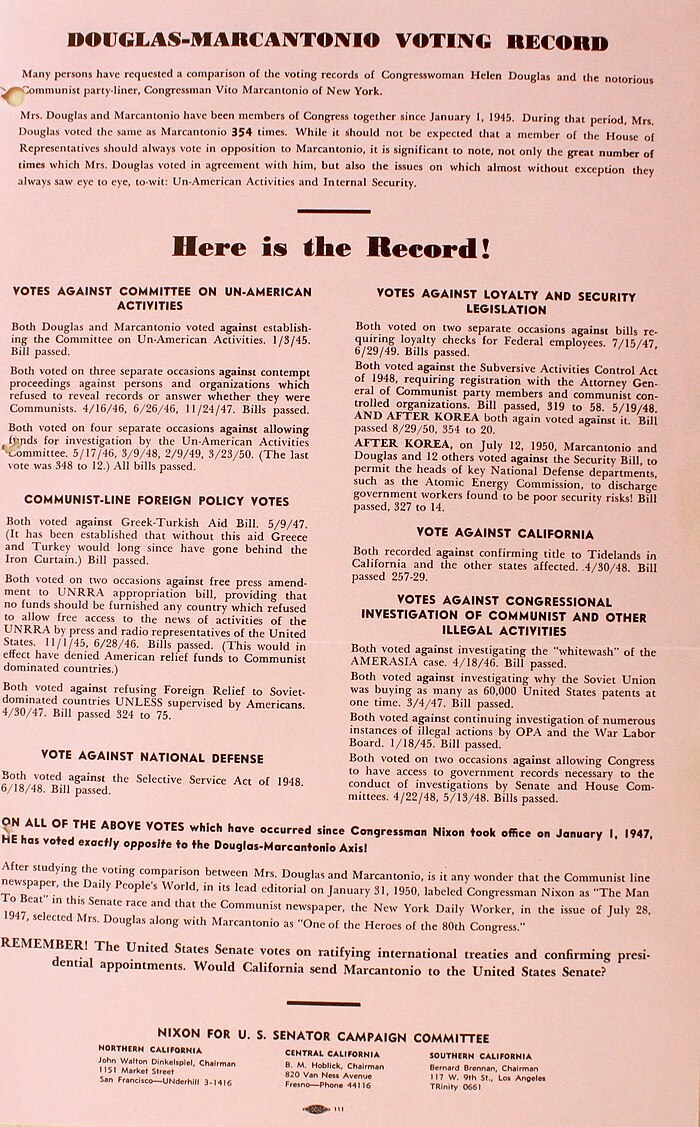
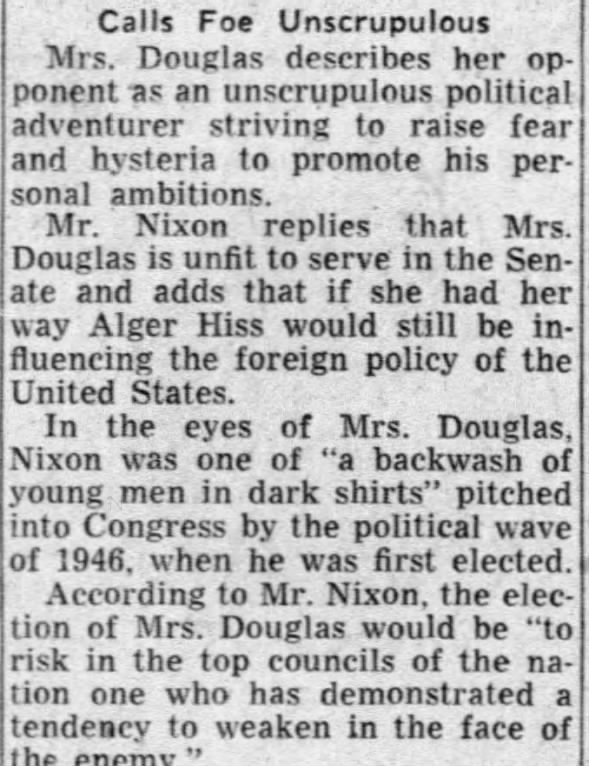 Sat, Nov 4, 1950 – 1 · The Baltimore Sun (Baltimore, Baltimore, Maryland, United States of America) · Newspapers.com
Sat, Nov 4, 1950 – 1 · The Baltimore Sun (Baltimore, Baltimore, Maryland, United States of America) · Newspapers.com
Dean Acheson, left (Yale `15, Harvard Law `18)
Adlai Stevenson, right (Princeton `22, Northwestern Law `26)


THE 1952 CONVENTION: MAKE A MENTAL NOTE ABOUT EARL WARREN
Matthews pp. 82-86 - Checkers (start about 16:00)
October 1, 1949: Mao wins in China. MAKE A MENTAL NOTE OF THE CHINA LOBBY
June 25, 1950: Korean War starts
"I have here in my hand a list of 205 . . . a list of names that were made known to the Secretary of State as being members of the Communist Party and who nevertheless are still working and shaping policy in the State Department."Maryland and the 1950 version of Deep fake
The legend of George Smathers, "Red Pepper" (Matthews, p. 70) and "Vote American"
 Sun, Apr 30, 1950 – 27 · The Tampa Tribune (Tampa, Florida, United States of America) · Newspapers.com
Sun, Apr 30, 1950 – 27 · The Tampa Tribune (Tampa, Florida, United States of America) · Newspapers.com
The home of Manchester Boddy (Matthews p. 69) is a local attraction in La Canada.
From a History Channel documentary on the Matthews book: Start at 9:00

 Sat, Nov 4, 1950 – 1 · The Baltimore Sun (Baltimore, Baltimore, Maryland, United States of America) · Newspapers.com
Sat, Nov 4, 1950 – 1 · The Baltimore Sun (Baltimore, Baltimore, Maryland, United States of America) · Newspapers.com
Dean Acheson, left (Yale `15, Harvard Law `18)
Adlai Stevenson, right (Princeton `22, Northwestern Law `26)


THE 1952 CONVENTION: MAKE A MENTAL NOTE ABOUT EARL WARREN
Matthews pp. 82-86 - Checkers (start about 16:00)
Wednesday, January 30, 2019
First Assignment, Spring 2019
Choose one:
The specifications:
- From popular books or periodicals, identify one myth about Nixon's pre-presidential career. Explain why this belief is inaccurate, and why people came to hold it.
- Analyze TV commercials in the 1960 campaign: http://www.livingroomcandidate.org/commercials/1960. Explain the strategy behind each candidate's TV campaign. Consider the policy environment and the state of public opinion. Did one candidate communicate more effectively than the other?
- Pick one of the debates in the 1960 campaign: https://www.debates.org/index.php?page=1960-debates . Who "won" and why? Consider both the content of what they said as well as their presentation on television.
The specifications:
- Essays should be typed (12-point), double-spaced, and no more than four pages long. I will not read past the fourth page.
- Please submit all papers in this course as Word documents, not pdfs.
- Cite your sources. Please use endnotes in the format of Chicago Manual of Style. Endnotes do not count against the page limit. Please do not use footnotes, which take up too much page space.
- Watch your spelling, grammar, diction, and punctuation. Errors will count against you. Return essays to the Sakai dropbox for this class by 11:59 PM, Friday, February 15. Papers will drop one gradepoint for one day’s lateness, a full letter grade after that.
Tuesday, January 29, 2019
Mr. Nixon Goes to Washington
- 1945 16%
- 1947 26%
- 1951 40%
- 1953 48%
- 1961 69%
- 1969 72%
JFK's first book (senior thesis at Harvard):

JFK's wartime experience got the Hollywood treatment:
About the peace thing, he said, "I told them that I know it is awfully hard to keep this in perspective. I told them that"--he seemed to grope for a date--"in 1939 I thought Neville Chamberlain was the greatest man living and Winston Churchill was a madman. It was not until years later that I realized that Neville Chamberlain was a good man, but Winston Churchill was right." Then he sort of shrugged his shoulders and said, "I doubt if that got over."
Communism and the Cold War. March 5, 1946:
Nixon's victory was NOT an unusual event in 1946.
Oil money in 1946
The Hiss Case
Evan Thomas writes:
Hiss was indeed a spy.
Whittaker Chambers, Witness:Nixon's victory was NOT an unusual event in 1946.
Oil money in 1946
The Hiss Case
Evan Thomas writes:
At a later session, as Nixon and Hiss were sparring over some point of law, Hiss huffily declared, “I am familiar with the law. I attended Harvard Law School. I believe yours was Whittier?” Robert Stripling, the committee's chief investigator, observed that “Nixon turned red and blue and red again. You could see the hackles on his back practically pushing his coat up."
Hiss was indeed a spy.
Those were the forces - Thomas Murphy, Richard Nixon, the men of the F.B.I. - who, together with the two grand juries and Tom Donegan and the two trial juries, finally won the Hiss Case for the nation. It is important to look hard at them for a moment. . . . For the contrast between them and the glittering Hiss forces is about the same as between them and the glittering French chivalry and the somewhat tattered English bowmen who won at Agincourt. The inclusive fact about them is that, in contrast to the pro-Hiss rally, most of them, regardless of what they had made of themselves, came from the wrong side of the railroad tracks. . . .Nixon did not play a prominent role in the HUAC investigation of Hollywood, but his presence on the committee left bad memories among people in the industry.
No feature of the Hiss Case is more obvious, or more troubling as history, than the jagged fissure, which it did not so much open as reveal, between the plain men and women of the nation, and those who affected to act, think and speak for them.
A friendly witness, the president of SAG:
McCarthy and the Kennedys:
A friend of the family
"It was hard to find a more committed Cold Warrior in either party than the thirty-four-year-old from Massachusetts"(Matthews, p. 75).

Monday, January 28, 2019
How did Roger Stone survive Watergate?
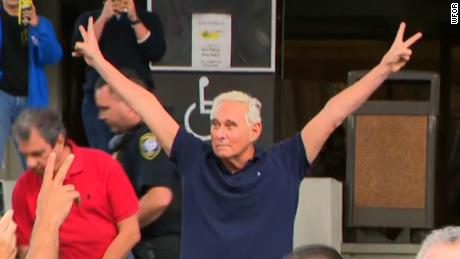
In an article in the Washington Post, the former director of the Nixon Presidential Library wrote about Stone's relationship to Nixon.
This was an interesting article especially after seeing the Nixon Foundation try really hard to distance itself from Stone.As a member of President Richard M. Nixon’s Committee to Re-Elect the President, better known as CREEP, Stone helped recruit a young operative to spy on a group of Quakers who had set up a peace vigil in front of the Nixon White House. Stone also admitted to Congress that he faked a contribution from the Young Socialist Alliance to Pete McCloskey, a liberal Republican who in 1972 was mounting a challenge to Nixon in the New Hampshire primary. After delivering the $135 in cash and receiving a receipt, Stone then drafted an anonymous letter to the conservative Manchester Union Leader with a photocopy of the receipt to discredit McCloskey.Stone did not merely engage in dirty tricks; in 1972, the then-19-year-old Stone was assigned by CREEP official Herbert “Bart” Porter to recruit a spy to penetrate the campaigns of Democratic presidential hopefuls. The secret Nixon agent, Michael W. McMinoway, introduced himself successively into the campaigns of Edmund Muskie, Hubert Humphrey and George McGovern. Stone became his case officer, receiving intelligence from McMinoway via a post office box in Washington.
Saturday, January 26, 2019
More on Stone and Nixon
The New York Times published this op-ed by Roger Stone on April 28, 1994, shortly after Nixon's death.Except pic.twitter.com/wP9dpiAK0b— Terence (@soWWMD) January 25, 2019
So what did you think of him?" I asked Richard Nixon after his first meeting with Bill Clinton.
"You know," Mr. Nixon replied, "he came from dirt and I came from dirt. He lost a gubernatorial race and came back to win the Presidency, and I lost a gubernatorial race and came back to win the Presidency. He overcame a scandal in his first campaign for national office and I overcame a scandal in my first national campaign. We both just gutted it out. He was an outsider from the South and I was an outsider from the West."
Thus the 37th President revealed the special kinship he felt with the 42d, despite their differences in party, philosophy and generation. And Mr. Nixon had a special reason to reach out: he was so deeply committed to the cause of increasing U.S. aid for the emerging republics of the former Soviet Union that he violated his own ironclad rule in dealing with successors -- to give advice only when asked.
Friday, January 25, 2019
Roger Stone and Richard Nixon
The wonderful thing about this course is that we do not even have to stretch in order to find connections to current events.
Roger Stone, whom the FBI arrested this morning, was a dirty trickster for Nixon. From The New York Times, July 22, 1973.
Stone remains a Nixon fan. He literally has a Nixon tattoo on his back.

Roger Stone, whom the FBI arrested this morning, was a dirty trickster for Nixon. From The New York Times, July 22, 1973.
The projects carried out were varied and imaginative. [Bart] Porter dispatched Roger Stone, the head of the District of Columbia Young Republicans, to New Hampshire to make a contribution to the McCloskey campaign on behalf of the Gay Liberation Front. (At the last moment, he balked at identifying himself as a homosexual and made the contribution in stead in the name of the Young Socialist Alliance.) Ted Brill, the 20‐year‐old chair man of the College Republicans at George Washington University, was paid $750 for six weeks in May and June, 1972, to join a group of Quakers carrying on a peace vigil in front of the White House. He was told to pass himself off as a member of the peace movement and find out “what the radicals were up to.”
...
After Muskie's defeat in several spring primaries, attention began to turn to the two remaining favorites—McGovern and Humphrey. In mid‐April, Hunt told Tom Gregory to switch his volunteer duties over to McGovern headquarters at 410 First Street, S.E. In addition to the kinds of information he had wanted on Muskie, Hunt asked Gregory to provide de tailed layouts of the offices of Gary Hart and Frank Mankiewicz, McGovern's two campaign managers. And some time in late spring, Roger Stone reportedly hired Michael McMinoway, a Louisville, Ky., private detective, and dubbed him “Sedan Chair II.” Soon, the exotically named informant had obtained a job in the Humphrey campaign and was sending reports through Stone to CREEP.
Stone remains a Nixon fan. He literally has a Nixon tattoo on his back.

Thursday, January 24, 2019
The Mystery of Young Nixon
In the last moments of his presidency, an exhausted RN free-associated about his life (discussion of parents at 11:00).
The opening lines of his memoirs: "I was born in a house my father built."

By the standards of the time, Nixon was not deprived. He had a BA and a law degree when less than five percent of people over 25 had graduated from college and when three-fourths had not even finished high school.
Garry Wills interviewed him for Nixon Agonistes (1969):
The opening lines of his memoirs: "I was born in a house my father built."
What starts the process, really are laughs and slights and snubs when you are a kid.Sometimes it's because you're poor or Irish or Jewish or Catholic or ugly or simply that you are skinny.
But if you are reasonably intelligent and if your anger is deep enough and strong enough, you learn that you can change those attitudes by excellence, personal gut performance while those who have everything are sitting on their fat butts.
You were a good athlete. But I was not and that was the very reason that I tried and tried and tried. To get the discipline for myself and to show the others that here was a guy who could dish it out and take it. Mostly, I took it.
"But once you learn that you've got to work harder than everybody else it becomes a way of life as you move out of the alley and on your way. In your own mind you have nothing to lose so you take plenty of chances and if you do your homework many of them pay off. It is then you understand, for the first time, that you have the advantage because your competitors can't risk what they have already.Quakerism -- a senior thesis about RN's religion

Garry Wills interviewed him for Nixon Agonistes (1969):
“You asked me if Teddy Roosevelt is my hero. Not in the sense that Wilson is. I think he was our greatest President of this century. You'll notice, too, that he was the best-educated"Nixon recommended Wilson's essay "Leaders of Men."
The competent leader of men cares little for the interior niceties of other people’s characters: he cares much-everything for the external uses to which they may be put. His will seeks the lines of least resistance; but the whole question with him is a question of the application of force. There are men to be moved: how shall he move them? He supplies the power; others supply only the materials upon which that power operates. The power will fail if it be misapplied; it will be misapplied if it be not suitable both in kind and method to the nature of the materials upon which it is spent; but that nature is, after all, only its means. It is the power which dictates, dominates: the materials yield. Men are as clay in the hands of the consummate leader.
Tuesday, January 22, 2019
Nixon and Claremont
Local color at 34:00
Wingert & Bewley became Bewley, Lassleben & Miller
In Richard Milhous Nixon, Roger Morris describes the district:
The district began in the east among the quiet settlements strung out beneath the San Gabriels at the northern rim of the basin. Claremont with its vineyards, shaded campuses, and midwestern Victorian homes gave way to the tiny citrus towns of La Verne, Glendora, and San Dimas; farther west, Monrovia, Duarte, and Arcadia nestled in the foothills...In its own rich valley to the south lay the business and residential center of Pomona ... Across the valley floor lay the old fiftieth Assembly district, more white-walled and red-tiled homes in Covina and West Covina ... El Monte, a larger town of 36,000, was nearby with its walnuts, still more oranges, and one of the basin's famous lion farms. And still farther south ... the district took in the slopes and valleys of Whittier and La Habra.
Jerry Voorhis

Roy P. Crocker was chair of Lincoln Savings and Loan and a benefactor of CMC. In a memo for a 1975 oral history, he recalled:
Herman L. Perry, Manager of the Bank of America branch in Whittier, knew about Richard M. Nixon's ability as a debater when he was in Whittier College. He telephoned to Nixon, who was in Baltimore renegotiating airplane contracts for the U. S. Navy Group, and suggested that he return to California and appear as a prospective candidate before the Fact Finding Committee, consisting of leading Republicans in the 12th Congressional District. Nixon appeared at about the second meeting of the committee and made an instantaneous favorable impression and he was selected as the candidal over seven other aspirants. Nixon received all but eight votes on the final ballot and then the vote was made unanimous. There were three assembly districts in the 12th Congressional District and three members from each district were selected to manage the primary campaign. I was one of the nine members chosen and I was elected Chairman of the Campaign. Roy Day was chosen by the committee as the Campaign Manager..



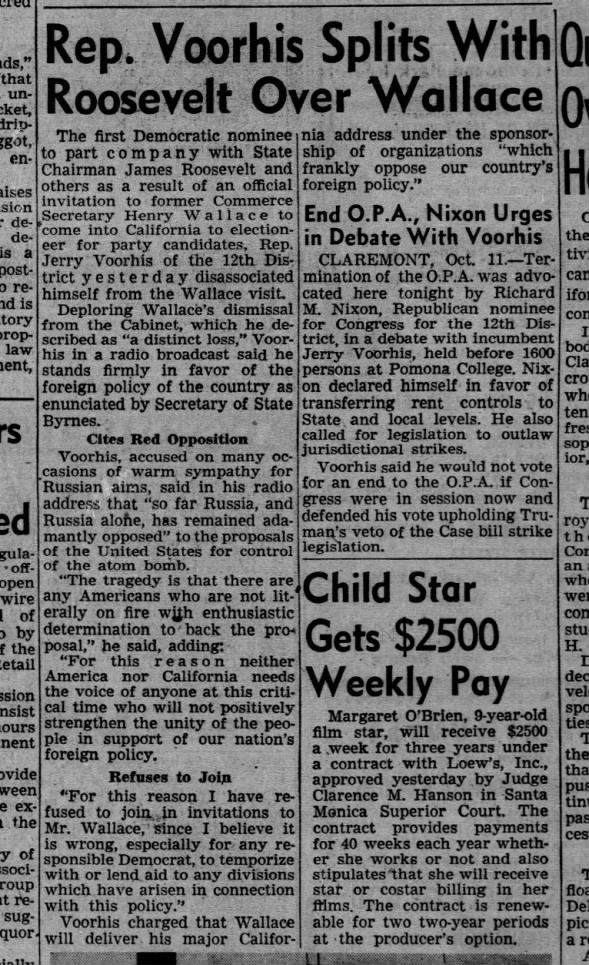 debate Sat, Oct 12, 1946 – 9 · The Los Angeles Times (Los Angeles, Los Angeles, California, United States of America) · Newspapers.com
debate Sat, Oct 12, 1946 – 9 · The Los Angeles Times (Los Angeles, Los Angeles, California, United States of America) · Newspapers.com
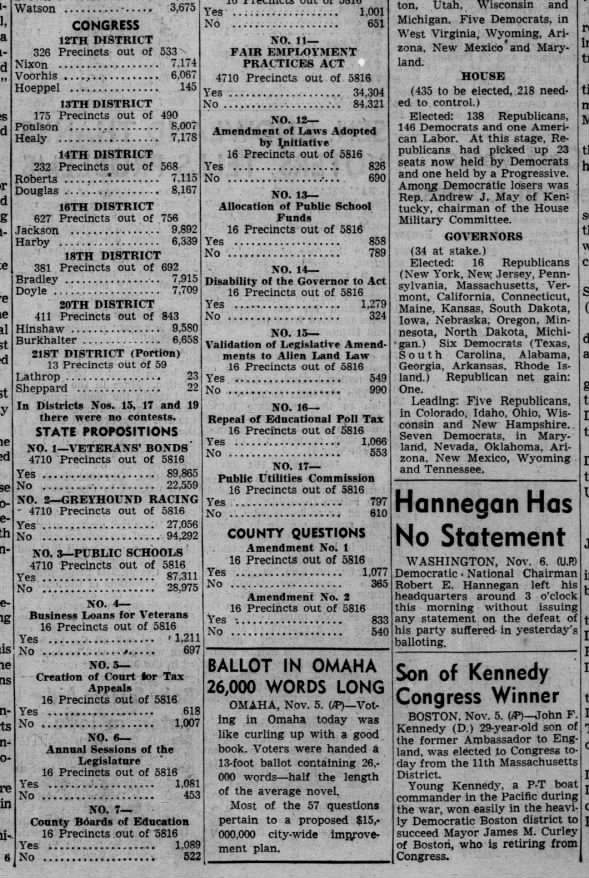 Wed, Nov 6, 1946 – 1 · The Los Angeles Times (Los Angeles, Los Angeles, California, United States of America) · Newspapers.com
Wed, Nov 6, 1946 – 1 · The Los Angeles Times (Los Angeles, Los Angeles, California, United States of America) · Newspapers.com
Al Felzenberg:
Nixon's internationalism, anti-communism, and interest in foreign affairs, for example, were evident very early. In his first months in Congress, Nixon took his first trip to Europe as part of a fact-finding tour of postwar conditions assembled by Massachusetts representative (and future secretary of state) Christian Herter. Nixon returned prepared to take on his party's isolationist wing in support of the Marshall Plan. In the last address he ever gave, he vividly recalled the impact that trip had on him. (William Elliott, the Harvard professor who advised the Herter Committee and befriended Nixon, would later help launch the career of another young man of promise, Henry Kissinger.)Los Angles Times 11/4/1949

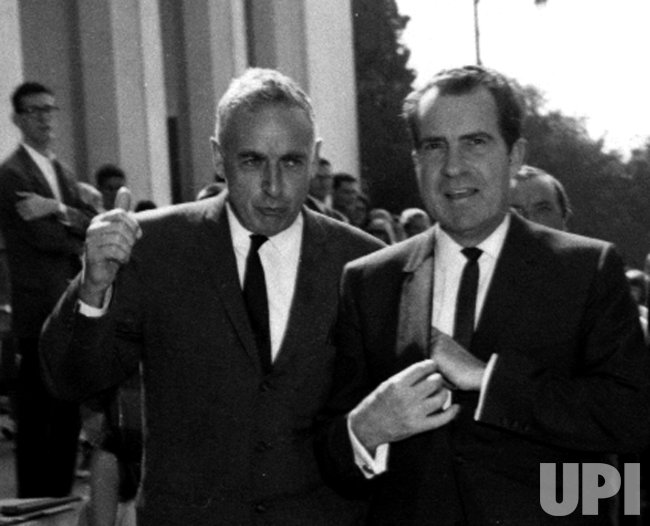
Subscribe to:
Comments (Atom)

